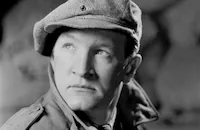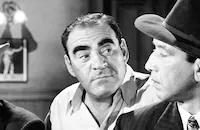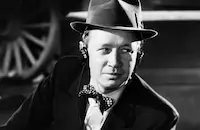Hey, Rookie
Brief Synopsis
Cast & Crew
Charles Barton
Joe Besser
Ann Miller
Larry Parks
Joe Sawyer
Jimmy Little
Film Details
Technical Specs

Synopsis
After he is drafted into the armed forces, musical comedy producer Jim Lighter is sent to an induction center at Fort MacArthur, California. There he meets fellow rookies Bert and Pudge Pfeiffer, who announce to the camp that he is a famous Broadway producer. Despite the fact that Jim has become disillusioned with the theater, Bert and Pudge suggest that he produce a camp show. Noting that morale is low due to insufficient recreation for the men, Colonel Robbins embraces the idea and orders Jim to produce the show. Jim's visions for a lavish production are shattered when the colonel orders him to restrict his performers to army talent and limits his budget to $209. Jim has already written his former sweetheart, showgirl Winnie Clark, about his extravaganza, however, and when Winnie reads his letter, she embarks upon a tour of the army camps along the Pacific Coast. En route, she discovers that her mother had deliberately sabotaged her relationship with Jim and vows to reconcile with him. When Winnie arrives at the army camp, however, the colonel assigns her to assist with the show, thus earning Jim's enmity. Jim's ego is further bruised when Winnie's mother notifies the newspapers that Winnie has arrived to save the show. Despite the many interruptions dictated by army routine, Jim puts together the show, but just as he readies for the debut, the general arrives for an inspection and the performance is postponed for war games. After Jim's crew is beaten soundly by their enemy team, the colonel advances the date of the revue so that the general will be able to attend. Although unprepared, Jim and the other entertainers take to the stage. The performance is a hit, and when Winnie appears in the finale, dressed as a WAC, she and Jim sing a duet and reconcile. After the curtain falls, Winnie informs Jim that the uniform is not a costume and that she has joined the army and is now a rookie, too.

Director
Charles Barton
Cast
Joe Besser

Ann Miller

Larry Parks

Joe Sawyer
Jimmy Little
Selmer Jackson
Larry Thompson
Barbara Brown
Charles Trowbridge
Charles Wilson
Syd Saylor
Doodles Weaver
Hi-lo Jack And The Dame
Condos Brothers
The Vagabonds
Johnson Brothers

Jack Gilford

Judy Clark
The Six Solid Senders
Bob Evans
Jerry O'leary
Hal Mcintyre
Mel Schubert
Bill Shawn
Jack Lee
Eddie Dunn
Philip Van Zandt
Dick Curtis

Ralph Dunn

Sidney Melton
Robert Lowell
Tom Dugan
Bob Haymes

Eddie Acuff
Harry Barris
Jimmy Dodd
Jack Rice
Joey Ray
Ed Laughton
Teddy Mangean
George Eldredge
John Tyrrell
Tim Morris
Jeanne Bates

Buddy Yarus
Crew
Lionel Banks
Ross Bellah
Irving Briskin
Edward Eliscu
Edward Eliscu
Edward Eliscu
Philip Faulkner
Jay Gorney
Jay Gorney
Jay Gorney
Jack Haynes
Joseph Kish
Sgt. J. C. Lewis Jr.
Wilbur Mcgaugh
Henry Myers
Henry Myers
Henry Myers
L. W. O'connell
Val Raset
Major Charles D. Sauvinet
M. W. Stoloff
James Sweeney

Film Details
Technical Specs

Quotes
Trivia
Notes
The film credits note that this production was originally "produced on the stage by the Original Yard Bird Club of Fort MacArthur for the benefit of the Athletic and Recreation Fund of Fort MacArthur, CA." The credits add that the title Hey, Rookie was originated by John Percy Halloway Walker. According to the Variety review, the army musical played the Belasco Theater in Los Angeles for thirty-six weeks. The Screen Achievements Bulletin credits Buddy Yarus in two different roles. Some modern sources erroneously include this title in the filmography of producer and one-time actor Robert Evans. Hey, Rookie marked the feature film debit of actor-comedian Jack Gilford.

Miscellaneous Notes
Released in United States Spring March 9, 1944
Released in United States Spring March 9, 1944











